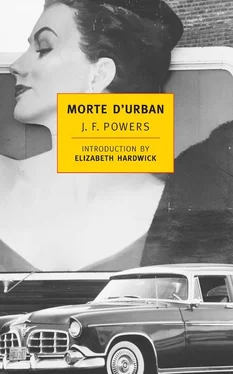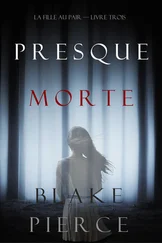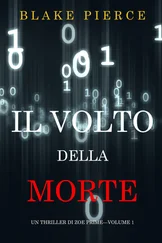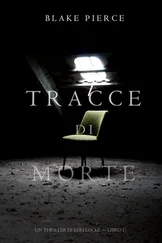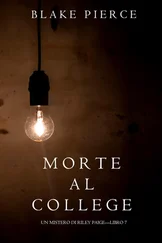“And what do you do here?” said Father Urban. The cabin was partitioned off into two sections.
“Just read and write,” said Mr Zimmerman, moving out of view. “This is where I do the writing.”
Father Urban looked in on an upright typewriter, straight-back chair, and library table. The typewriter was old and had a patient look. On the wall, there was a larger-than-life photograph of the late junior senator from Wisconsin. There was also a filing cabinet. “And what do you write?” said Father Urban, retreating to the other section where there were chairs. Lincoln and Washington were in there.
“Wait,” said Mr Zimmerman, from the room where he did the writing. He brought Father Urban a large scrapbook with covers of dark polished wood. In wood of a lemon color, inlaid, were the words: “LETTERS TO THE EDITORS BY CARL P. ZIMMERMAN.”
“One of the boys at the prison made that for me,” Mr Zimmerman said. “A former employee. I didn’t ask him to, but I wrote and thanked him.”
“I should think you would,” said Father Urban, wondering if that was all Mr Zimmerman had done. “Minneapolis Tribune . St Paul Pioneer Press . CHICAGO Tribune ,” said Father Urban, and looked up to see Mr Zimmerman smiling. “J. Edgar Hoover,” said Father Urban, coming upon one of his open letters. “How’d he get in here?”
“I thought that one was worth keeping. One of his best. The Shrapnel Brothers were here two weeks ago. Spent the day here.”
Father Urban didn’t reply at once.
“You know who they are?”
“Yes.” Yes. Most of Mr Zimmerman’s letters had appeared in the Drover , with the Ostergothenburg Times a close second. Father Urban had reached the point where he didn’t know what to say. “I take it,” he said, “you write mostly for the newspapers.”
“And magazines,” said Mr Zimmerman. He went into the room where he did the writing. He returned with a sheet of paper. “Here’s one I wrote a month or two ago — no, I see it was longer than that. This went to Time magazine,” he said, handing a carbon copy to Father Urban.
“But wasn’t published?”
“No, it wasn’t — at least not yet.”
“Has Time published anything of yours?”
“No, and I don’t have to tell you why.”
“No?”
“Pink.”
Father Urban didn’t reply at once.
“I wouldn’t say that to you — a stranger — if you weren’t a Catholic priest,” said Mr Zimmerman.
Father Urban believed that there was a great deal to be said for the conservative position, but he also believed — since a tree is known by its fruit — that Mr Zimmerman and his sort weren’t the ones to say it. He handed back the carbon copy and closed the scrapbook. Wouldn’t Mr Zimmerman be happier living in town? There were too many references to turtles and skunks and bears in his letters to the editors — snapping turtles down in Washington, dirty skunks down in Washington, and Russian bears. “You haven’t always lived out here, have you?”
“Just since I retired.” Mr Zimmerman said he wished now he’d retired sooner, and had started reading and writing sooner. “But I’ve still got some good years left.”
“I’m sure you have.”
“Well, we’d better be getting back.” Mr Zimmerman carried the carbon copy into the other room.
Father Urban stood up and moved over to a large screened-in window. The trees, with their crisp green needles, were beautiful, and somewhere a bird was singing. “Nice here, Mr Zimmerman.”
“I have to have a lot of quiet,” said Mr Zimmerman, from the other room. He came out of it with more carbon copies — a great many more. “You may want to take a look at these. And maybe we’d better bring this along, too.”
So, with Mr Zimmerman carrying the carbon copies, and Father Urban carrying the heavy scrapbook, they returned to the chairs and the lake. Mrs Zimmerman was there and brought Father Urban, over his good-natured protests, another bumper of Icy-ade.
Before Father Urban had got around to the carbon copies, which lay on the grass by his chair, two couples arrived who looked a lot like the Zimmermans. They came from cottages near by, and bearing food by which Father Urban later remembered them, since their names didn’t register with him. A few minutes later, a man and a dog approached from the other direction—“Oh, oh,” said somebody. The man and the dog passed on up the beach, the man waving but not as though he expected much response. There was none. Soon the man and the dog returned, and this time they walked up to the chairs. The man was about Father Urban’s age but not in his condition. The dog was an aged Airedale, a breed you seldom saw nowadays, and was the color of dark chocolate that had melted and hardened and lightened. Both man and dog were greeted by the Zimmermans and their friends — Father Urban sensed it was because there was nothing else to do — and the dog came off a little better than the man. When they’d passed by before, Father Urban had felt the man’s eye on him, picking him out, and now the man made straight for him. After they were introduced to each other, the man stayed with him.
“St Clement’s Hill,” he said. His name was Studley and he smelled of beer. “Isn’t that where they have this new golf course?”
“Yes, we do.”
“You have an air strip, too, don’t you?”
Father Urban smiled. “No, I’m afraid not.”
“Don’t you have some kind of tie-in with Flying Farmers?”
“No.”
“No air strip?”
Father Urban just looked at him.
“Somebody said you did,” said Mr Studley, not weakening.
Father Urban gazed away for a moment. All around him people were drinking from tinkling tankards, including Mr and Mrs Zimmerman who, it seemed, hadn’t wanted to get too early a start. “No,” said Father Urban, coming back to Mr Studley, who still appeared skeptical. “Not that I know of, and I was there yesterday.”
Mr Studley laughed. He could have used a bra under his knit sport shirt. “Well, I’ll take your word for it. Say, I hope you won’t mind if I don’t call you ‘Father.’”
Not everybody had been listening before. Now everybody was — and scarcely a tinkle was heard from the tankards.
“That’s entirely up to you, Mr Studley,” said Father Urban.
“I’m not a Catholic myself. I’m not much of anything, as a matter of fact. But you know what it says in the Good Book. ‘Call no man thy father.’”
“Yes. Well, it’s O.K. with me.”
“I like your style, sir. You’re not from around here, I’d guess.”
“For many years I traveled out of Chicago,” Father Urban said. “But I’m proud to call Minnesota my home now, Mr Studley.”
This appeared to make little or no difference to Mr Studley, but then Father Urban hadn’t been talking to him so much as to the others — and they’d liked it fine.
“I see you don’t wear the collar, Mr Urban.”
Father Urban could do without the “Father,” but that didn’t mean he’d take “Mister.” Nothing was better than that. “Up in the car,” he said slowly, “with my coat.”
“How’s Myra, Grover?” said the woman who’d brought the shortcake. Her husband had carried the strawberries, still in their boxes.
“Still in Cleveland,” said Mr Studley, not paying much attention to the question. He was gazing up toward the cottage. “Say, I’d like to have a look at that,” he said.
“The car? Why, yes,” said Father Urban. Immediately, he moved off with Mr Studley and the dog, thinking he was doing everybody a favor.
After walking around the car a couple of times, and feeling it here and there, Mr Studley opened the door on the driver’s side.
Читать дальше
